John Hagstrom and Phyllis Bleck during a CSO tour in the early 2000s
In this essay, second trumpet John Hagstrom, who holds The Bleck Family Chair in the Chicago Symphony Orchestra, salutes a longtime CSO benefactor and friend.
Phyllis Bleck is an outstanding citizen within the Chicago Symphony Orchestra family. Her connection to the CSO began in the 1940s when she attended children’s concerts with her parents. By that time, she had already been studying the trumpet since beginning lessons in the third grade. About 20 years later, she had become such an accomplished trumpeter that she was frequently hired to perform with the CSO when extra players were needed. That is an outstanding accomplishment in itself, but after several more years working as a professional musician, Phyllis decided that what she wanted most was to become a doctor. She went back to school and subsequently began an extremely successful career as a thoracic surgeon.
All the while, she has kept a close connection to the CSO, and in more recent years she has become increasingly active as a Governing Member within the Chicago Symphony Orchestra Association. She currently serves on the Governing Members Executive Committee as Vice Chair of the Annual Fund. She is a Stradivarian Associate of the Theodore Thomas Society, and most recently she made a substantial endowment gift commitment to name a trumpet section chair in the Chicago Symphony Orchestra as the Bleck Family Chair. This gift will help to provide the secure footing needed to promote the CSO’s preeminent role as a cultural icon showcasing musical brilliance, leadership and innovation.
I am so honored to occupy the Bleck Family Chair, and as a CSO member since 1996, I have also known Phyllis Bleck almost from the beginning of my time in the Orchestra. She has accompanied the CSO on numerous concert tours, traveling along with other patrons to hear the CSO perform in Europe and Asia. It was on these tours that I really began to get to know her, and I asked about her experience both as a professional musician and as a physician. Phyllis is very modest and doesn’t seek the spotlight, but this spring she finally agreed to tell me more about how she found so much success within two very challenging careers. Her story is inspiring, and she continues to lead by example, committed to preserving the musical impact that the CSO shares with the world.
Phyllis says there was always music in her house growing up. Her mother was not a professional musician but sang frequently, and her brother studied piano. She grew up initially in River Forest (just west of Chicago) and began playing the trumpet when different instruments were offered as part of her school’s music program. She might have started on the violin, but her family dentist recommended the trumpet because he observed that her teeth were well suited for playing a brass instrument, “so they handed me a trumpet and said, ‘This is it!’”
Her parents took her downtown each week for trumpet lessons, and Phyllis first heard the CSO live when her grade school arranged for students in the school orchestra to attend CSO concerts for children. She recalls sitting in the gallery when, at the end of the concert, the audience was given a choice of what music they wanted the orchestra to play, “and everyone of course wanted to hear Rossini’s Overture from William Tell, which at that time was the theme of ‘The Lone Ranger’ television program.”
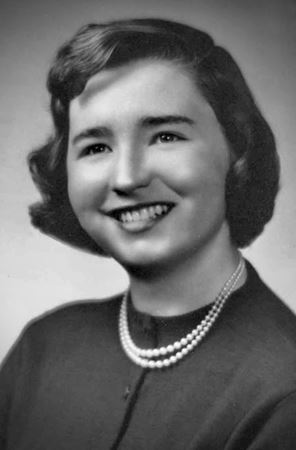
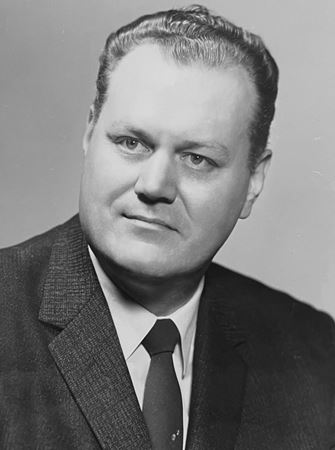
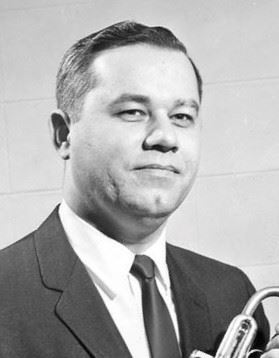
In high school, Phyllis attended the Illinois Summer Youth Music camp at the University of Illinois. When it came time for college, she decided to attend the University of Illinois to pursue a degree in music education beginning in the fall of 1954. She studied there with Haskell Sexton, the school’s trumpet professor. The CSO’s principal trumpet player at that time had become quite famous within just a few years of his arrival in 1948, and Phyllis decided that she needed to study with him, too. His name was Adolph Herseth (CSO Principal Trumpet, 1948-2001). Standing in the way of her hope to study with him was the fact that he would only consider teaching trumpet players who had auditioned successfully for the Civic Orchestra of Chicago and had been awarded a scholarship for lessons with him.
Undeterred, she auditioned and was admitted to the Civic while still a student at U. of I. She recalls taking the train up to Chicago on Fridays to first hear the CSO’s Friday afternoon concert, followed by a rehearsal of the Civic Orchestra. In those years, John Weicher (a member of the Chicago Symphony Orchestra from 1923 until 1969, who also served as concertmaster and personnel manager) led the Civic Orchestra, and Phyllis recalls the importance he played within the CSO, saying, “John Weicher deserved respect and credit for his influence on Chicago musicians.” While she was in the Civic Orchestra, he hired her to play for the first time with the Chicago Symphony Orchestra on October 22, 1959, with Fritz Reiner conducting. She performed as one of the extra trumpeters called for at the end of Respighi’s tone poem The Pines of Rome. She frequently performed with the CSO in the coming years, and she can be seen in the CSO’s annual photo in October 1963. She subsequently studied at Northwestern University with Vincent Cichowicz (CSO trumpet, 1952-74) and graduated with a master of music degree in 1968. In 1970, she completed a doctor of musical arts degree at the University of Southern California and then became a music professor for several years at Whittier College.
Detail of the CSO's October 1963 class photo (left to right): trumpets Phyllis Bleck, Frank Kaderabek, Vincent Cichowicz and Adolph Herseth
Rosenthal Archives
Leopold Stokowski conducts Khachaturian's Symphony No. 3 in February 1968. Phyllis Bleck appears in the back row, second from the right.
Terry’s Photography, Rosenthal Archives
After all of these musical accomplishments, Phyllis decided to change course completely and pursue a new career path to become a doctor. She recalls having had an interest in medicine going back to her years in high school, “but in those days, there weren’t as many opportunities for women to become doctors.” Starting medical school much later than most students is a challenge, and just gaining admission into a medical school can be very difficult. She overcame this obstacle by enrolling in medical school first in Guadalajara, Mexico. Classes were entirely in Spanish, so she first spent several months learning the language. After a few years, she transferred back to Rush Medical College in Chicago, graduating in 1979 and subsequently becoming a very successful thoracic surgeon.
She stopped performing as a trumpeter once she started medical school but still attended CSO concerts regularly. She still sits in her gallery subscription seat in Orchestra Hall many times each season, and she began taking on more of a leadership role for the Orchestra when she was first elected as one of the CSO’s Governing Members in 1997. She encourages others to also become involved in supporting the Orchestra and leading the way toward preserving a secure future for the impact and transformation the music provides for audiences. “You’ve got to engage people, and the orchestra members are very good at that. Just stopping to say hello is very important. Speaking positively about the CSO to others and describing the benefits it gives to listeners is something we can all do as supporters.”
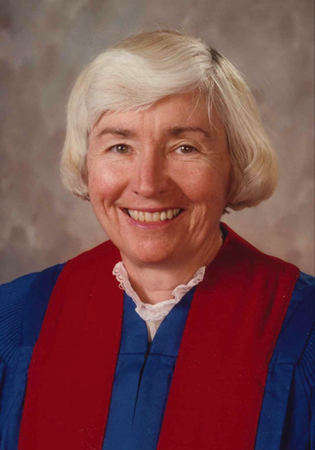
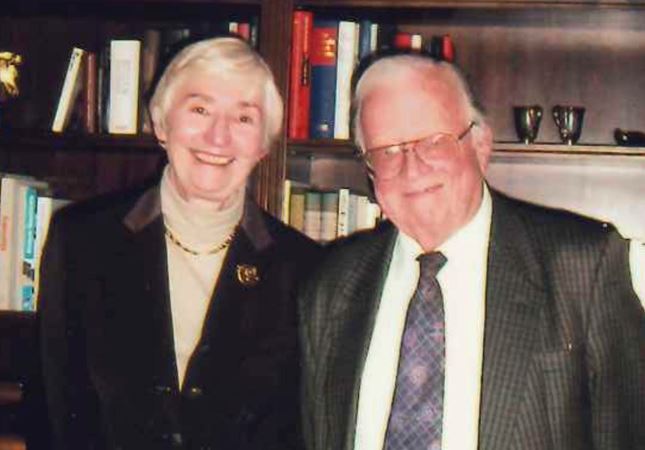
Dr. Phyllis Bleck is inspiring to me as a musician and as a CSO supporter. She knows firsthand what it takes to be able to achieve the level of performance needed from the CSO, and she also knows the kind of commitment from donors and patrons that this great orchestra needs to sustain its excellence. Thank you, Phyllis, for your generosity and your leadership by example. Sitting in the Bleck Family Chair is a great honor for me, now and for all of my remaining years as a Chicago Symphony Orchestra musician.
John Hagstrom and Phyllis Bleck prior to the CSO’s concert in Orlando on Feb. 28, 2023
Nuccio DiNuzzo



